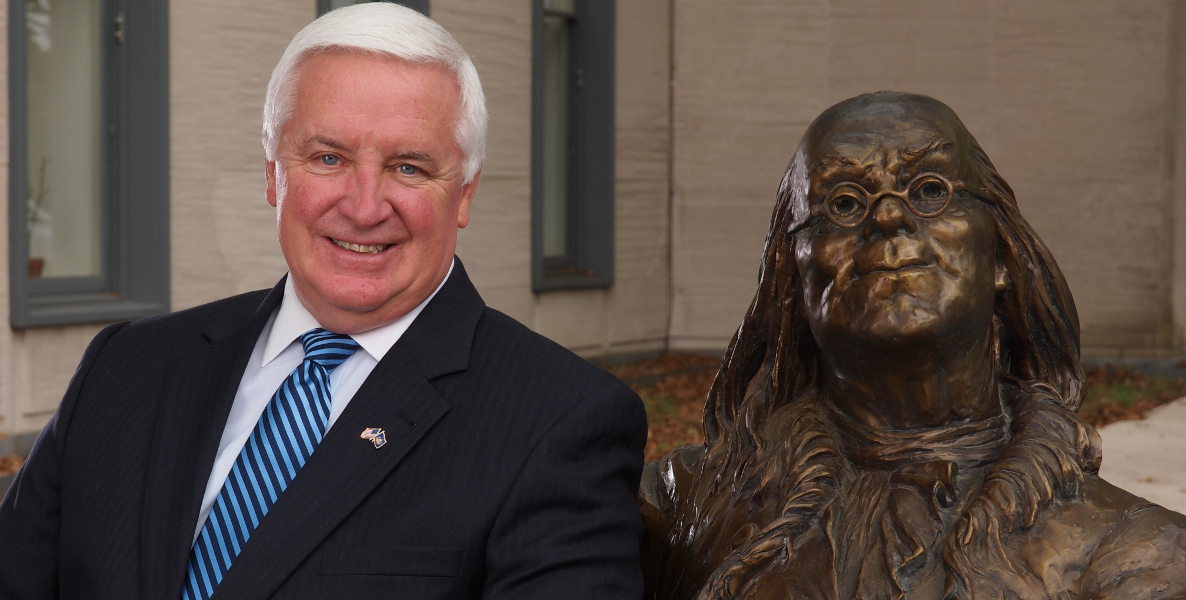Richard Vague doesn’t project as a firebrand. He’s a soft-spoken, gentlemanly 59-year-old fixture around Rittenhouse Square, where he can often be found toting heavy tomes on debt economics. Last year, when he met the stunning Laura La Ferla—he would go on to marry her—he told friends about his surprising late in life love affair and one quipped: “The only other time I’ve seen you come this alive is when you’re talking about debt.”
Truth is, Vague is a man of many passions. He helps fund the groundbreaking gene therapy cancer research of Dr. Carl June at Penn, and has remade Philadelphia’s Fringe Festival into one of the coolest arts festivals anywhere. But it is his quixotic economic work that might truly be his most radical undertaking.
Here’s the background: While a banker in the early to mid-aughts, Vague noticed a sudden 85 percent surge in private debt—credit card, mortgage, personal and business loans. His bank’s chief economist told him not to worry, but Vague—figuring the bill would eventually come due—presciently cashed out.
In the aftermath of the Great Recession, he noticed that the debate centered on public, and not private, debt. Conservatives preached budget austerity and liberals evangelized for federal stimulus dollars. Vague was struck by the absence of any talk about what he’d noticed at the bank: Private debt. So he hired his own band of heterodox economists—not to mention another team to poke holes in his team’s findings—and he unlocked the key to predicting economic calamity.
We’re whistling past the graveyard. Underfunded pensions means that other things—particularly infrastructure and education—are slowly being starved in our states and cities. Bridges don’t get repaired and class sizes get ever larger. So, yeah, there will be wringing of hands, there will be lamentations, there will be promises to do things, but we’ll continue to starve these big needs if we don’t do something big.
As outlined in his 2014 book, The Next Economic Disaster: Why It’s Coming and How To Avoid It, he found that, throughout history, economic collapse has virtually always occurred when two things happen simultaneously: Private debt grows by more than 20 percent in a decade, and a nation’s private debt to GDP ratio exceeds 150 percent. In other words: When private debt gets to a certain level, it can topple whole economies—as it has here during the Great Depression and Great Recession. It was a fiscal smoking gun.
But the truly revolutionary part of Vague’s work came when he started advancing his cure to the private debt bubble he’d discovered: Widespread debt restructuring. In other words: Forgiving loans, as Croatia has now done for its poorest citizens. The proposal was radical, especially given Vague’s biography. After all, he’d made his fortune in banking as CEO of First USA Bank and then Juniper Capital. Now, here he was, telling members of his own class that they needed to forgive loans in order to serve the common good.
These days, Vague and his team of economists are holed up in a Center City boardroom, working on an ambitious followup, titled The Paradox of Debt, in which they have literally pieced together the history of the last 200 years of economic activity in Germany, France, the United States, China, Japan, and the United Kingdom—accounting for 95 percent of all economic activity in history. I’d heard that his research had led him to examine our pension crisis, and that the findings weren’t encouraging. We began our conversation there.
The Citizen: What made you start looking at underfunded pension liabilities, both here and nationwide?
Vague: We have continued our investigation of the whole question of private debt, and we’re kind of digging into every little corner of the problem. Well, you can’t do that without hearing frequently from people, “Well, and then there’s pensions, too.” Which I dismissed at first, and then finally I asked, “What is this pension thing everybody is talking about?” Turns out, the unfunded pension liability is probably a bigger problem than the conventional debt of states and municipalities. Our federal debt is $20 trillion. Our research shows that the debt from underfunded state and city pension systems [nationally] is anywhere between $2 trillion and $5 trillion. So we began to believe pension debt is just another form of debt that we needed to layer on top of our analysis.
The Citizen: The Inquirer recently wrote about our pension problem, but there wasn’t much in the way of solutions offered. How bad is it, and what should our game plan be?
Vague: The issue in Philadelphia is similar to the issue at state and municipal pensions all across the country. They’re underfunded and not governed by ERISA [Employee Retirement Income Security Act], a 1974 law that governs the pensions of corporations. States and municipalities were excluded from that. It effectively means that states and cities can get away with a level of underfunding that corporations cannot. So across the country we have underfunded pensions [to let us use the money elsewhere]. At a certain level of underfunding, usually between 50 and 70 percent, there’s no level of performance from an investment return standpoint that can get you back up to where you need to be. That’s why we have case studies like Kentucky’s teacher retirement fund, which is only 27 percent funded.
The Citizen: Philadelphia is currently just over 50 percent underfunded—so we’re probably right around that spot where you can’t grow yourself out of the problem.
Vague: That’s right. Philadelphia may not be in a death spiral, like Chicago and Kentucky, but we’re getting dangerously close.
The Citizen: The city is now embroiled in a soda tax debate to fund pre-K. Are you saying that issues like that, while riveting daily stenography, are marginal or, at best, incremental, while the elephant of underfunded pensions tramples our room?
Vague: We’re whistling past the graveyard. Underfunded pensions means that other things—particularly infrastructure and education—are slowly being starved in our states and cities. It is something of an irreversible national trend. Bridges don’t get repaired and class sizes get ever larger because of this insidious, incremental devolution, if you will. So, yeah, there will be wringing of hands, there will be lamentations, there will be promises to do things, but we’ll continue to starve these big needs if we don’t do something big [with pension debt].
The Citizen: More than 15 percent of the city’s annual budget goes to propping up the pension shortfall.
Vague: Yes, and that’s growing. I think we’re at a point where it’s going to be well nigh impossible for cities and states to fix this problem by themselves.
The Citizen: To that point, Councilman Allan Domb has proposed some things the city can do to address the gap, like selling delinquent business tax and utility liens to professional collectors, but all told, such reforms total a few hundred million. We need nearly $6 billion. So what can be done?
Vague: Remember, this is not a problem unique to Philadelphia. That’s why the only thing I can think of is a federal rescue.
The Citizen: Oy vey. How would that work?
Vague: If I fast forward in my own mind to, say, 10 to 15 years from now, when [we have no choice but to deal with this], there would have to be a quid pro quo. There would be a federal rescue, but two things would have to happen. One is a solution that so many corporations, and many states and cities, have adopted—to grandfather existing employees but to discontinue the defined benefits program for any future employee. Second would be a set of reforms that would surely include some of the ingredients of ERISA to make sure these kind of problems don’t happen in the future. And it would probably include reforms on the way these pensions are managed. There’s been mismanagement—the placement agents that [candidate for State Treasurer] Ambassador Joe Torsella is talking about banning in Pennsylvania are a great example of inappropriate management of funds.
The Citizen: Is part of your research for the book looking into and arguing for an eventual federal bailout?
Vague: No, because I don’t think it does any good. These things never happen absent a crisis. I think it’s pretty clear what could be done, but if anything the appetite is the very opposite of that. Washington, DC has way more problems than it knows what to do with already.
This is not a problem unique to Philadelphia. That’s why the only thing I can think of is a federal rescue.
The Citizen: It feels like I woke up one day and was told we’re in an underfunded pension crisis. So here’s a naive question: How did we get here?
Vague: I tend to think that most pensions were set up in the post World War II period under the assumption that we would always grow rapidly. Remember, we were growing at 2 percent per year population growth then, which is very fast, and GDP growth was at 6 to 10 percent.
So I would argue that most of the corporate and city and state pensions that were all set up then were unsustainable from inception. But add to that the fact that politicians found it a winning electoral formula to go to a constituency like a union and continually sweeten the pot, so what was already borderline unsustainable in anything but a very high growth environment became highly unsustainable.
The Citizen: So what can the average person do about a silent killer like underfunded pensions?
Vague: We all need to pay more attention. I think insisting on fiscal responsibility from the Mayor and City Council is kind of where it all starts. The voter turnout relative to a City Council election shows you the level of disinterest. Lining up behind candidates that make good business judgements and are willing to deal with things like this is the first step.
The Citizen: Has this city government been paying attention and responsive to your ideas?
Vague: I don’t want to be critical of our city government at all, because this is not something specific to Philadelphia or Pennsylvania. It’s pervasive across the country. I don’t think Philadelphia has done a particularly better or worse job than anywhere else. The political system has a hard time dealing with something that is this massive.
The Citizen: In your first book, you propose widespread debt forgiveness. But how is that not seen just as a form of income and wealth redistribution?
Vague: We’ve augmented this since The Next Economic Disaster came out. Here’s how I would do it. If you have a $400,000 mortgage on a $300,000 house, we’d let your lender write the mortgage down to, say, $250,000 and let that lender spread their pain over an extended period, like 30 years. That enables them to do it, and you to get relief. But in exchange, you have to give your lender a certificate that gives them half or more of the [home’s equity] when and if you sell your house. It’s like a type of debt for equity swap. If your neighbor cries, “That’s unfair!” we’ll say to him, you can do it too—but you have to give up the equity upside in your home. So hopefully that mitigates or eliminates the concern about debt restructuring fairness.
The Citizen: And, again, your point is that banks restructure loans all the time.
Vague: That’s right, debt is a contract. Contracts are restructured all the time. My entire career in banking, we had a loan-restructuring group. Problem is, it’s in the best interest of those who have capital for there to be a belief that not repaying a loan is a moral failing.
The Citizen: But debt isn’t necessarily bad, right? I mean, didn’t deficit spending help get us out of the Great Depression?
Vague: That’s why we’re calling this next book The Paradox of Debt because debt is good—it helps fuel the economy—until it’s not. We know this intuitively. For an individual or a business, low or moderate debt can be effectively utilized. But there’s a point too much leverage is counterproductive.
The Citizen: And can bring whole systems down.
Vague: Exactly.
The Citizen: How is the mainstream economic community reacting to your work?
Vague: We’re getting a tiny positive reaction from the economic community, particularly among younger economists who are more empirical and less theoretical. I don’t think we have much of a chance with somebody who has spent 30 or 40 years of their career preaching the opposite of what we’re saying.
But we’re also getting a lot of positive feedback from the investment world. I’m now working on a corollary theory with a couple of folks on Wall Street. Just as aggregated rapid debt growth is predictive of a systemic crisis, the theory is that, within any subcategory of lending—say, oil & gas or commercial real estate—if all you knew was the rate of debt growth in that category, you could predict calamity within that industry. In other words, you wouldn’t need to know the credit policies of organizations within that industry or the price of commodities. Instead, the total amount of debt is all you need to know to predict economic downturn.
The Citizen: Who else is making the case you’re making?
Vague: There’s a small coterie of folks who are doing it. Adair Turner, who was chairman of Britain’s Financial Services Authority during the crisis, wrote a book called Between Debt & The Devil, which holds that private debt was the issue. He makes a great case, but his answer is more “helicopter money”—Ben Bernanke’s strategy of just flooding the market with more money. It’s as if Adair got all the way to the swimming pool, got on the diving board, but didn’t jump in. I’m saying, Adair, how can the problem be private debt and the solution not be private debt?
But there are a growing number of thinkers coming around to this point of view. That’s why we launched privatedebtproject.org, a journal that’s publishing many of them.
The Citizen: Finally, you could buy an island and be on it somewhere. Why are you spending so much time trying to change America’s economic philosophy?
Vague: I’ve been very, very lucky. I don’t have to work, which has been true for some time. What motivates me is doing things that matter. Plus, this is just fun, you know?
Photo header: Flickr/Jacob Edward








